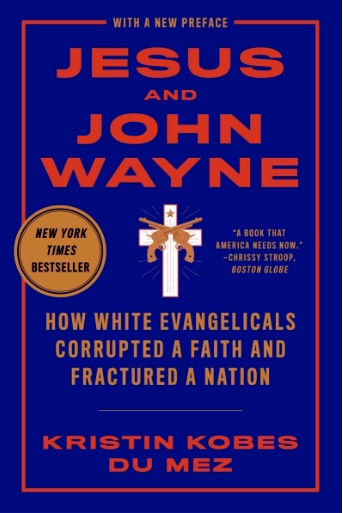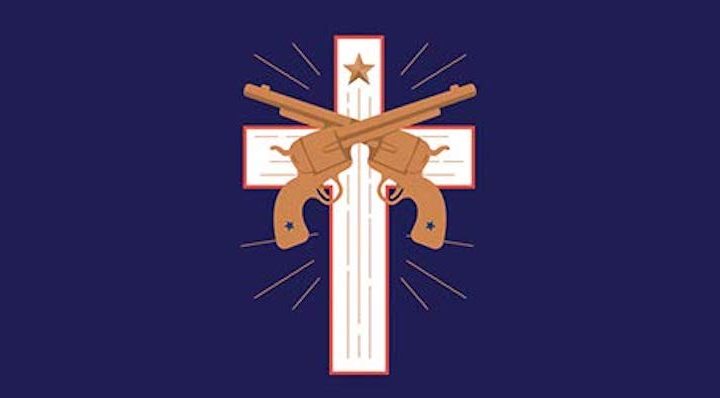Some conservative Christian leaders continue to blast Kristen Kobes Du Mez for writing Jesus and John Wayne: How White Evangelicals Corrupted a Faith and Fractured a Nation, the Calvin University historian said during a recent webinar on evangelicalism in the U.S.
Her 2020 book documents white evangelical efforts to substitute the compassionate Jesus of the New Testament with a ruggedly masculine and Christian nationalist Savior.

Kristin Kobes Du Mez
“What’s discouraging is that most of the pushback from certain evangelical leaders or academics has not engaged my book as a work of scholarship, but have been attempts to discredit me, personally, or to write off the book,” Du Mez said during the Jan. 22 episode of the “Theology Lab” webinar series hosted by Highrock Covenant Church in Arlington, Mass.
She added that most of the attacks have come in the form of shots taken at her on social media. “I expected more engagement of my book as a work of scholarship but received almost none of that.”
But Du Mez, who is a member of the Christian Reformed Church, said the negativity she has endured pales in comparison to the positive responses she has received from individual Christians and clergy.
“Less visible are the hundreds and thousands of evangelical laypeople and pastors — including many white evangelical, complementarian men — who have engaged my work with integrity and openness. As a historian, you cannot ask for more,” she said. “The hits I take are a tiny percentage of the responses I get. Every day I get letters of affirmation.”

Walter Kim
Joining Du Mez in the discussion was Walter Kim, president of the National Association of Evangelicals, who said the pushback against the book may derive in part from its critique of popular American figures — like John Wayne — who embody the tough-guy characteristics many evangelicals want to instill in Jesus.
“Evangelicalism, like every cultural movement, needs its heroes,” he said. “Something deeply challenging is happening in this work because these heroes are being taken down a notch.”
But the hostility aimed at Du Mez and her book is ironic coming from evangelicals whose Bible is replete with imperfect, broken heroes who are redeemed by God, Kim said. “That becomes a mandate and we as evangelicals ought to be the quickest to be self-critical, and I think this is a failure.”
“We just don’t like actually being sinners.”
The book also taps into the discomfort evangelicals feel when confronted with the sin of their own movement, Kim said. “We just don’t like actually being sinners. We can say abstractly that we are, but when confronted with a sin we want to repudiate it, and I think evangelicalism is experiencing that.”
Du Mez added that many evangelical leaders have misunderstood the academic nature of Jesus and John Wayne. “The pushback is on these theological points because they are seeing the book as theology rather than history.”
Many evangelicals also have been confused by a false dichotomy between modern concepts of masculinity and the character and personality of Jesus, she said. “Meekness and compassion should not be confused with weakness.”
 Yet white evangelical culture now believes that “meekness is weakness and feminine, and that compassion is for girls,” she added. “You need aggression to fight for the truth. It is that separation that has done so much harm to the Christian witness.”
Yet white evangelical culture now believes that “meekness is weakness and feminine, and that compassion is for girls,” she added. “You need aggression to fight for the truth. It is that separation that has done so much harm to the Christian witness.”
Du Mez read aloud the fruits of the Spirit presented in Scripture, such as love, peace, kindness and gentleness. “Those sound pretty feminine when you consider the modern constructs of this rugged masculinity,” she quipped.
The spiritual consequence of that disconnect is to drive a wedge between evangelicals and Jesus, Du Mez said. “Celebrating a warrior Christ” cuts them off “from the whole Christ of the New Testament.”
Evangelicals fixated on a rugged concept of Jesus are also introducing a stark dichotomy between genders that is not supported by the Bible, Kim said.
“In the Scriptures, differences (between male and female) are built in, but that doesn’t necessarily mean they are oppositional. They can be complimentary. If a gendered way of looking at things were so important, it would be commanded.”
Related articles:
Jesus and John Wayne exposes militant masculinity in the age of Trump | Analysis by Alan Bean
Christian masculinity, culture and racism: An interview with Kristin Du Mez | Analysis by
Greg Garrett


